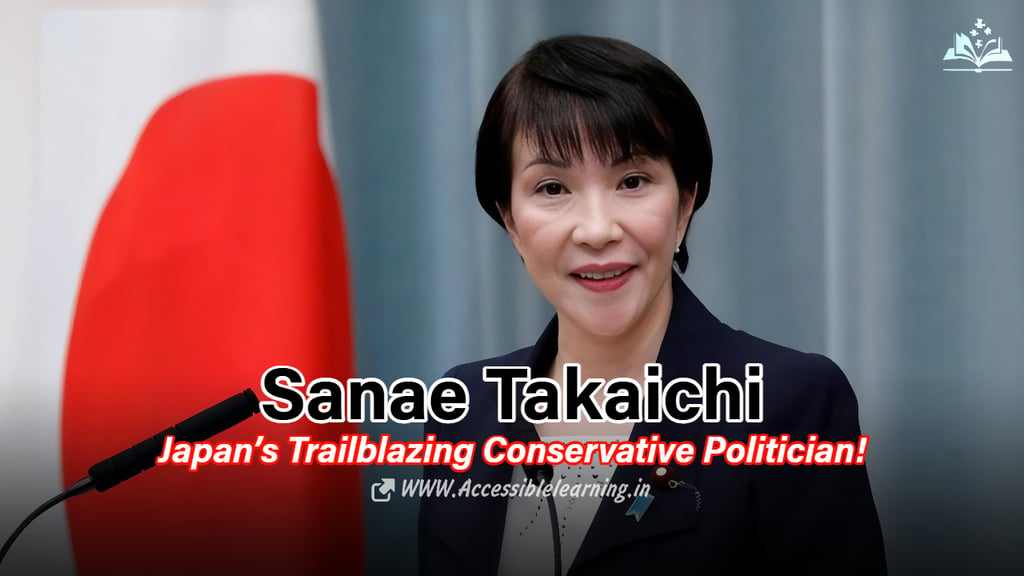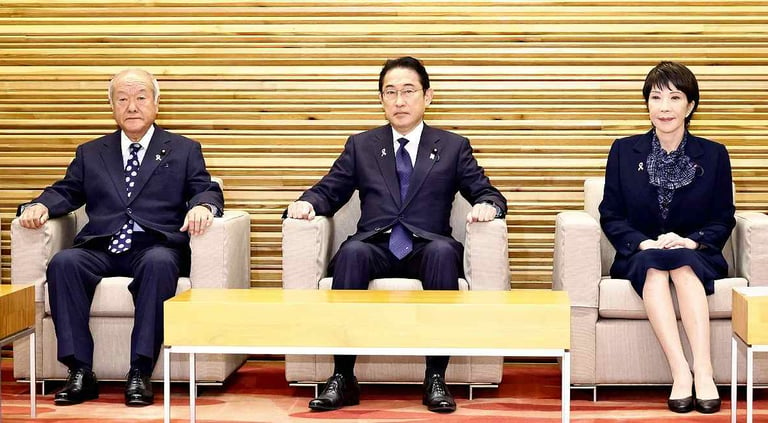
Sanae Takaichi: Japan's Pioneering Political Leader
This comprehensive profile examines the remarkable political journey of Sanae Takaichi, from her early beginnings to becoming one of Japan's most influential conservative politicians. Discover her unique policy positions, leadership style, and the lasting impact she has made on Japanese governance as a trailblazing female figure in a traditionally male-dominated political landscape.
JAPANBIOGRAPHYPOLITICAL JOURNEY
Kim Shin
4/12/20257 min read


Sanae Takaichi 高市早苗 stands as one of the most prominent and influential female politicians in Japan's contemporary political landscape. Rising through the ranks of Japanese politics in a traditionally male-dominated environment, Takaichi has established herself as a formidable figure known for her conservative policy positions and unwavering dedication to her political principles. This article explores her background, political career, key policy positions, and the significant impact she has made on Japanese politics.
Early Life and Education
Born on March 7, 1961, in Nara Prefecture, Sanae Takaichi developed an interest in politics from an early age. Her academic journey began at Kobe University, where she studied economics and laid the foundation for her future career. She further enhanced her educational credentials with a master's degree from the Matsushita Institute of Government and Management, an institution known for producing numerous political leaders in Japan.
Interestingly, before entering politics, Takaichi worked briefly as a research assistant at the University of Tokyo and spent time studying in the United States at the Weatherhead Center for International Affairs at Harvard University. These international experiences helped shape her global perspective despite her nationalist political stance.
Political Ascension
Takaichi's political career commenced in earnest when she won her first seat in the House of Representatives in 1993. This achievement marked the beginning of a steadfast political journey that would see her rise through various positions of increasing responsibility and influence within Japan's political system.
What many don't know is that Takaichi initially entered politics as an independent before joining the Japan New Party and later the Liberal Democratic Party (LDP). This political evolution demonstrates her strategic adaptability in navigating Japan's complex factional politics.
Her dedication and political acumen earned her recognition within the Liberal Democratic Party, Japan's dominant political party. Throughout her career, she has held several key cabinet positions that have solidified her reputation as a capable and determined leader.
Cabinet Positions and Leadership Roles
Among her most significant appointments, Takaichi served as the Minister of Internal Affairs and Communications under Prime Minister Shinzo Abe's administration. In this role, she oversaw critical national communications infrastructure and internal governmental affairs, demonstrating her capability to manage complex ministerial responsibilities.
Notably, Takaichi made history as the first female Minister of State for Economic and Fiscal Policy, one of the most influential economic positions in the Japanese government. She also served as the chairperson of the LDP Policy Research Council, placing her at the center of the party's policy development—a rare achievement for a woman in Japanese politics.
Takaichi's resilience in politics is evident through her ability to maintain relevance and influence across multiple administrations. Her consistent reelection to the Diet (Japan's parliament) underscores the trust her constituents place in her leadership and representation.
Political Ideology and Policy Positions
Characterized as a conservative politician, Takaichi has been vocal about her nationalist views and traditional approach to Japanese values and governance. Her positions often align with the conservative faction within the LDP, particularly on matters related to
Constitutional reform, especially regarding Article 9, which renounces war
Economic revitalization through fiscal policies
National security concerns, particularly regarding regional tensions
Preservation of traditional Japanese cultural values
Her economic policies have frequently emphasized the importance of fiscal discipline while promoting growth initiatives, reflecting her background in economics and her pragmatic approach to governance.


The "Iron Lady" of Japanese Politics
Takaichi has earned the nickname "Japan's Iron Lady," drawing comparisons to former British Prime Minister Margaret Thatcher due to her unwavering conservative principles and formidable presence. She embraces this comparison, having openly expressed admiration for Thatcher's leadership style and policies.
What makes this comparison particularly interesting is that Takaichi has displayed similar resolve in the face of opposition. When serving as Internal Affairs Minister, she once took the unprecedented step of refusing to approve a broadcasting license renewal for a television network that she believed had violated political neutrality requirements—a move that generated significant controversy but demonstrated her willingness to take bold actions based on her convictions.
Controversial Yasukuni Shrine Visits
One of the most controversial aspects of Takaichi's political identity is her regular visits to the Yasukuni Shrine, which honors Japan's war dead, including several Class A war criminals from World War II. These visits have strained Japan's relations with neighboring countries, particularly China and South Korea, who view such acts as glorifying Japan's militaristic past.
Unlike some politicians who avoid the shrine to prevent diplomatic tensions, Takaichi has been unapologetic about her visits, framing them as a matter of honoring those who sacrificed for the nation. This stance has strengthened her appeal among nationalist voters while generating criticism from those concerned about regional diplomacy.
Breaking the Glass Ceiling
As one of the few women to reach senior positions in Japanese politics, Takaichi has navigated significant barriers in a political system where female representation remains disproportionately low. Despite these challenges, she has established herself as a political leader whose influence transcends gender considerations.
What's particularly notable is that she achieved this without leveraging gender as a political asset. Unlike some female politicians who emphasize women's issues, Takaichi has largely avoided positioning herself primarily as a woman in politics, instead focusing on her policy positions and political philosophy.
Her advancement in politics represents an important milestone for women's participation in Japanese governance, even as she has sometimes taken positions that differ from traditional feminist perspectives. This complexity makes her an intriguing figure when examining women's roles in conservative political movements.
The "Sanaenomics" Economic Vision
During her 2021 bid for LDP leadership, Takaichi unveiled her economic vision, dubbed "Sanaenomics"—a clear reference to the "Abenomics" policies of her mentor, former Prime Minister Shinzo Abe. Her economic platform incorporated three key pillars:
A commitment to bold monetary easing
A pledge to delay the achievement of a primary budget surplus until Japan overcomes deflation
Investment in crisis management and growth areas, particularly advanced scientific fields
This economic program demonstrated her willingness to continue Abe's economic legacy while adapting it to address emerging challenges in the Japanese economy, particularly the impact of the COVID-19 pandemic.
Unique Connection with Spirituality and Politics
A lesser-known aspect of Takaichi's life is her connection to spiritual and religious matters. She serves as an advisor to the Shinto Political Alliance Diet Members' Association and has supported various initiatives to preserve traditional Japanese religious practices. This intersection of spirituality and politics adds a fascinating dimension to her political identity.
She has advocated for the importance of maintaining Japan's spiritual heritage, including controversial positions regarding the Emperor's divine status—a stance that resonates with traditional conservatives but has raised concerns among those who emphasize Japan's post-war secular democratic foundations.
Leadership Aspirations
In a significant development in her career, Takaichi announced her candidacy for the LDP leadership position in 2021, following Prime Minister Yoshihide Suga's decision not to seek reelection. This bold move positioned her as the first woman to make a credible bid for the leadership of the LDP with formal factional backing.
During this leadership contest, Takaichi secured crucial support from former Prime Minister Shinzo Abe, demonstrating her strong connections within the party's influential conservative faction. Her campaign centered on economic recovery, national security enhancement, and a proud assertion of Japanese values on the world stage.
Although she ultimately did not secure the position, her campaign highlighted her political ambitions and reinforced her status as one of Japan's most influential female politicians. Her willingness to compete at the highest levels of Japanese politics demonstrated her determination to shape the future direction of both her party and the nation.
Policy Legacy and Influence
Throughout her career, Takaichi has been instrumental in shaping various policy initiatives, particularly in the domains of
Telecommunications and digital infrastructure development
Administrative reforms aimed at increasing governmental efficiency
Economic policies aligned with the broader "Abenomics" framework
National security and defense policy formulation
Her influence extends beyond specific policy accomplishments to include her role in normalizing the presence of women in leadership positions within Japanese conservative politics. This representation has potential long-term implications for gender diversity in Japan's political landscape.


Personal Interests and Lesser-Known Facts
Outside of her political career, Takaichi maintains several intriguing personal interests that provide insight into her character. She is an accomplished motorcycle enthusiast who has been known to ride a Harley-Davidson—a hobby that stands in contrast to the typically reserved image of Japanese politicians. This passion for motorcycles has occasionally been used in her political campaigning to project an image of dynamism and independence.
Takaichi is also a trained pianist with a deep appreciation for classical music, particularly Mozart. She has spoken about how music provides her with balance and perspective amidst the pressures of political life.
Perhaps most surprising to many is her early career connection to Japanese rock music. In her youth, Takaichi worked briefly as a DJ at a radio station and has maintained connections with figures in Japan's entertainment industry—relationships that have occasionally proven useful in her political communication strategies.
Public Perception and Political Style
Takaichi is known for her straightforward communication style and unwavering commitment to her political principles. Her approach has earned her both staunch supporters who appreciate her consistency and critics who challenge her conservative positions.
Media coverage of Takaichi often emphasizes her status as a female leader in a male-dominated political environment, but she herself has generally downplayed gender aspects, preferring to be evaluated on her policy positions and administrative capabilities. This approach has garnered respect even from political opponents who may disagree with her ideological stance.
Her political resilience is particularly noteworthy in a system where factional politics often determines careers. Takaichi has managed to maintain relevance across changing political dynamics, demonstrating considerable political adaptability while remaining true to her core ideological commitments.
Influence on Japan's International Relations
Takaichi's foreign policy positions reflect a pragmatic nationalism that prioritizes Japan's security interests while maintaining crucial international alliances. She has been a consistent advocate for strengthening the Japan-US security alliance while also calling for Japan to develop more autonomous defense capabilities.
Regarding regional relations, Takaichi has taken firm positions on territorial disputes with neighboring countries, particularly concerning the Senkaku/Diaoyu Islands dispute with China and the Takeshima/Dokdo Islands dispute with South Korea. These stances have sometimes generated diplomatic tensions but have reinforced her image as a defender of Japanese national interests.
Her approach to international relations emphasizes economic cooperation where mutually beneficial while maintaining firm positions on security matters—a balanced approach that reflects Japan's complex position in East Asian geopolitics.
Sanae Takaichi represents an important figure in understanding the evolving landscape of Japanese politics. Her career illustrates both the persistent challenges and emerging opportunities for women in Japanese political leadership, while her policy positions reflect the complex interplay between tradition and change in contemporary Japan.
As Japan continues to navigate economic challenges, demographic shifts, and changing regional dynamics, leaders like Takaichi will play crucial roles in determining the nation's path forward. Her career serves as an instructive case study in political perseverance and the gradual transformation of gender roles in one of the world's most significant democracies.
Whether one agrees with her political positions or not, Takaichi's impact on Japanese politics is undeniable, and her continuing influence will likely shape policy discussions and political developments in Japan for years to come.
Subscribe To Our Newsletter
All © Copyright reserved by Accessible-Learning Hub
| Terms & Conditions
Knowledge is power. Learn with Us. 📚


